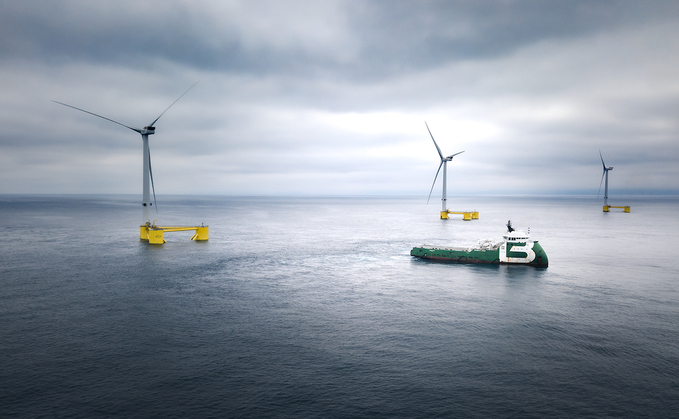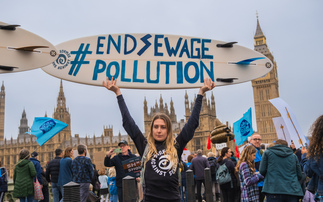
Credit: Principle Power
Yesterday's clean power auctions were more competitive than expected, but there is an urgent need for the government to now accelerate the timetable for future auctions
Yesterday's clean power contract auction results had something for everyone. There was a record breaking number of projects for green investors and clean energy advocates. A surge in new solar projects for solar developers. A return to form for an offshore wind industry that had stalled under the last government. And genuinely competitive prices for those who think renewables hold the key to lower bills. But there was also insufficient new capacity for those who fear the government is badly off track to meet its clean power targets. And an increase in prices compared to previous auctions for those net zero sceptics who fear renewables will one-day bankrupt the UK. The beauty or otherwise of the results were very much in the eye of the beholder.
The general consensus from government and from across the renewables industry is that this was a positive set of results, and the general consensus is right.
The offshore wind industry is back with 4.9GW of capacity secured at a clearing price of £58.87/MWh at 2012 prices, nearly 20 per cent below the reserve price of £73/MWh. Competitive auctions clearly work. The world's largest floating offshore wind project - which could prove a trail-blazer for a whole new industry - also secured a contract, albeit at a higher price of around £140/MWh.
The solar industry is poised for a major development boom, with 3.3GW of capacity securing contracts and prices remaining relatively low at £50/MWh despite substantial inflationary pressure. The onshore wind industry only secured 1GW of contracts, but they included one of the first English projects to advance following the lifting of the 'de facto' ban on new projects - more should soon follow. Prices were also competitive at around £50/MWh. Meanwhile, the tidal stream sector continued to make progress, with 28MW of projects securing contracts at £172/MWh - a strike price 13 per cent lower than the contracts awarded through the previous auction.
Over 130 projects boasting a total of 9.6GW of capacity now have access to guaranteed power prices and the bulk of them should be delivered well ahead of 2030. Billions of pounds of new green investment will be mobilised, thousands of skilled jobs will be created, 11 million homes will be provided with clean power, and UK emissions and fossil gas imports will be reduced. This is all good news.
However, there are legitimate reasons why the reaction to the auction results was not universally positive and they point to some big challenges for Labour as it seeks to accelerate clean power development right across the UK.
The auction results may have set a record for the number of projects securing contracts, but they fell well short of the 11GW capacity record set in 2022. As such, it is questionable as to whether the new pipeline makes up for the ground lost by the failure of last year's auction to secure any new offshore wind projects. It is touch and go that the new capacity lined up this week would put the UK on track to meet the previous government's target of a clean power system by 2035. But it is definitely insufficient to meet the new government's hugely stretching target of clean power by 2030.
It is important to note Labour has left itself some wriggle room with its reluctance to define precisely what 'clean power by 2030' means and its manifesto commitment to "maintain a strategic reserve of gas power stations to guarantee security of supply". It will also be hoping the Hinkley Point C nuclear project is not subject to further delays and is able to provide a decent chunk of the UK's power before the end of the decade. But everyone understands and accepts that meeting both the clean power target and, much more importantly, the UK's emissions targets for 2030 and 2035 will require a lot more renewables capacity - and fast. (Given Conservative attacks on the feasibility of Labour's clean power target the point about overall emissions remains key - you can question the wisdom of such rapid power sector decarbonisation, but there is no doubt development does need to accelerate significantly if legally binding emissions goals are to be met).
Labour is well aware its ability to deliver the new project pipeline is reliant on rapid planning reform, a lot more grid and energy storage capacity, and a significant expansion in the industry's supply chain and skills base. But it also needs to deliver more and bigger clean power contract auctions, and if it wants to meet the 2030 goals it will probably have to stage them more frequently than once a year. There are thought to be a number of offshore wind projects that did not secure contracts today simply because the budget was tapped out. Those projects need to be green lit very soon if the 2030 goals are to be met.
The government's appetite for delivering bigger and fast-tracked auctions is likely to rest on the answer to the other big question presented by today's auction results - what will be the impact on energy bills?
The problem is this question is impossible to answer with absolute confidence, dealing as it is with hugely variable future scenarios. Critics of the UK's net zero transition were out in force today, arguing the auction amounts to a £1.2bn a year subsidy for the renewables industry and insisting that when you translate the new contract strike prices from 2012 to current prices most of the new projects could end up selling power at a level above wholesale power prices.
But this analysis is questionable. The government could make comparisons easier by providing information on contracts in both 2012 and current prices, but as Bob Ward at the Grantham Institute pointed out the large offshore wind projects have secured contracts at a cost of around £75/MWh in today's prices, which is below the average day-ahead price for electricity recorded by Ofgem for most of the past three years. Even the most expensive offshore wind farms to secure contracts yesterday are offering power at a price in the same ballpark as current wholesale prices. The new solar and onshore wind farms promise to deliver sizeable savings for bill payers.
Of course, wholesale power prices could come down in the future, but they could also go up. Domestic energy bills are about to increase this autumn, and as the past few years have shown they could quickly surge again in the future. Under such a scenario, long term contracts with domestic clean power producers could become an absolute bargain. As anyone with a mortgage knows, there are considerable benefits associated with a fixed long-term price.
Yes, the cost of grid upgrades has to be considered, but so too does the cost of carbon emissions and air pollution from fossil fuel power plants and the cost of the volatility inherent in relying on gas imports.
To complicate matters further, new renewables projects have the potential to put downward pressure on wholesale power prices by reducing the UK's reliance on fossil gas imports. This downward pressure could become even more intense as new energy storage and demand response technologies come online. It is true that, somewhat counterintuitively, renewables could lead to higher green levies on energy bills to cover the cost of contracts for difference - but they could still push down bills overall by dampening wholesale prices.
Consequently, there is a compelling case for the new government to move swiftly to deliver further clean power auctions, at the same time as fast tracking planning reforms, accelerating grid development, and boosting supply chain investment. Indeed, if it wants to deliver on its stated climate and clean energy goals it will probably have to. There is considerable uncertainty here and a lot of competing interests, but one thing is certain: the more renewables you have the less gas you have to import and burn - and in the long run that is good news for the climate, for UK energy security, and for billpayers.
A version of this article first appeared as part of BusinessGreen's Overnight Briefing email, which is available to all BusinessGreen Intelligence members.










